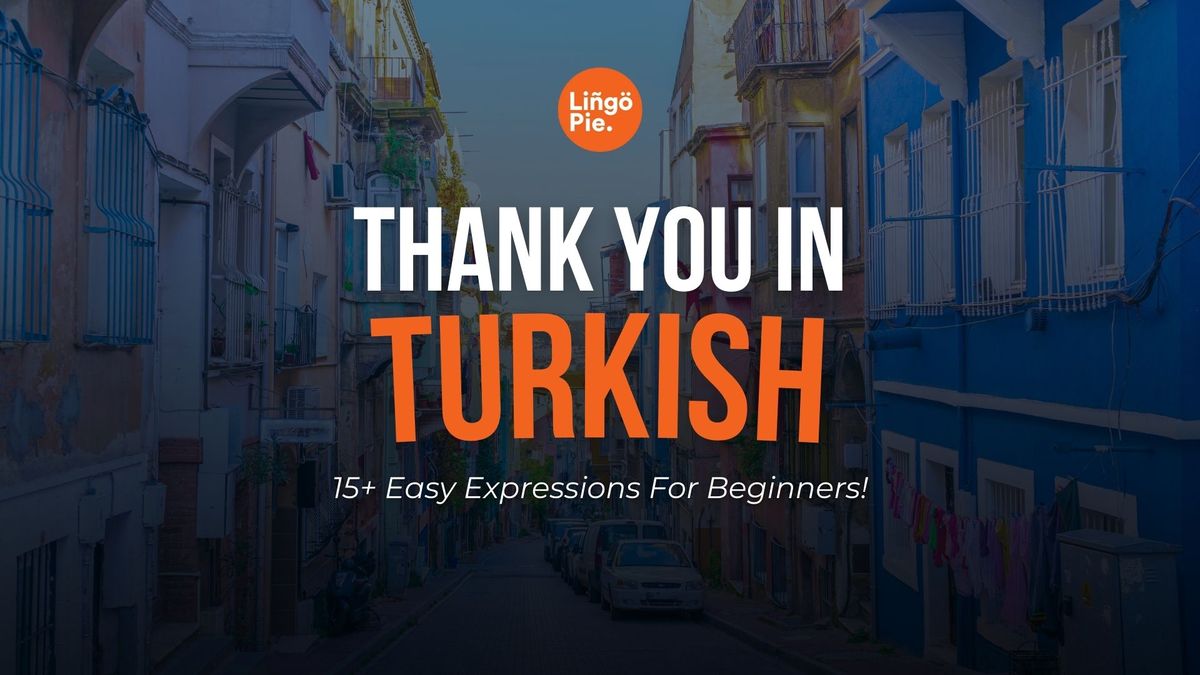You know that feeling when you're in a foreign country, and someone helps you out, but all you can do is smile and nod like a broken toy? Yep, been there, done that. But let me tell you, after hanging out with a bunch of Turkish friends and exploring Turkey a few times, I've learned one thing...
Learning to say "thank you" in Turkish is an absolute must!
You see, one of the first things that hits you about Turkey is how incredibly helpful and friendly the people are. Lost? They'll point you in the right direction. Confused about a menu? They'll practically order for you. It's like the whole country is on a mission to make your day better!
So, I thought, why not share the love? In this post, let's go over the best ways to say thank you in Turkish whether it's for formal or casual interactions with native speakers. Let's begin!

How To Say Thank You In Turkish?
There's more than one way to say "thank you" in Turkish, and here's a little insider tip: locals don't just stick to "teşekkür ederim" all the time.
If you want to blend in and learn Turkish while speaking like a pro, you've got to mix it up a bit. That's why I've rounded up these awesome phrases that'll have you express gratitude like a true Turk in no time.
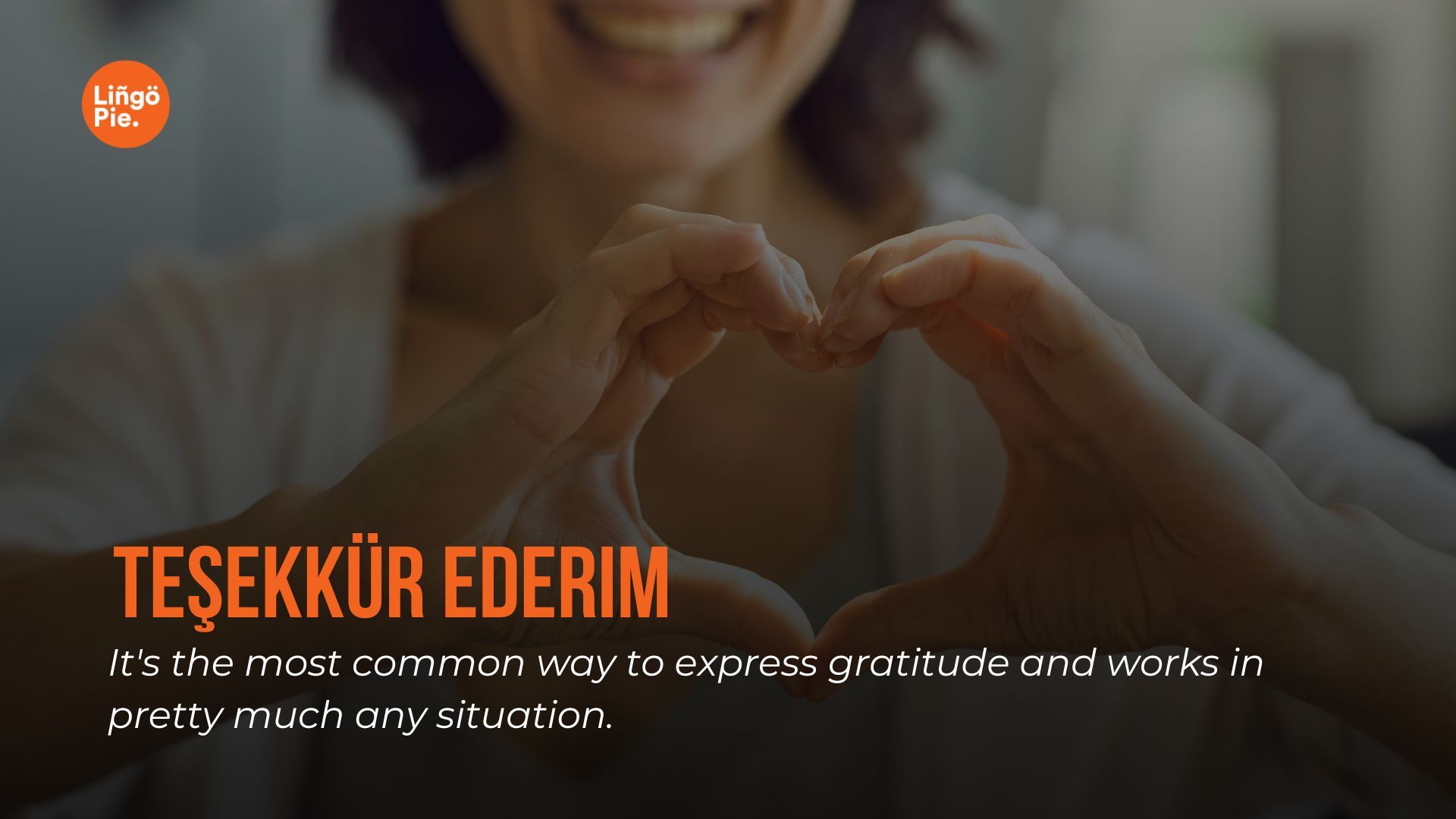
Teşekkür Ederim
Translation: Thank you
It's the most common way to express gratitude and works in pretty much any situation. Want to kick it up a notch? Just add "çok" at the beginning to say "çok teşekkür ederim," which means "thank you very much." And if you're speaking for a group, no worries – just swap "ederim" for "ederiz" to say "teşekkür ederiz," meaning "we thank you."
How to respond to tesekkur ederim?
The most common reply is "Rica ederim," which basically means "You're welcome" or "It's my pleasure." If you want to sound a bit more casual, go for "Önemli değil," which translates to "It's not important" or "No big deal."
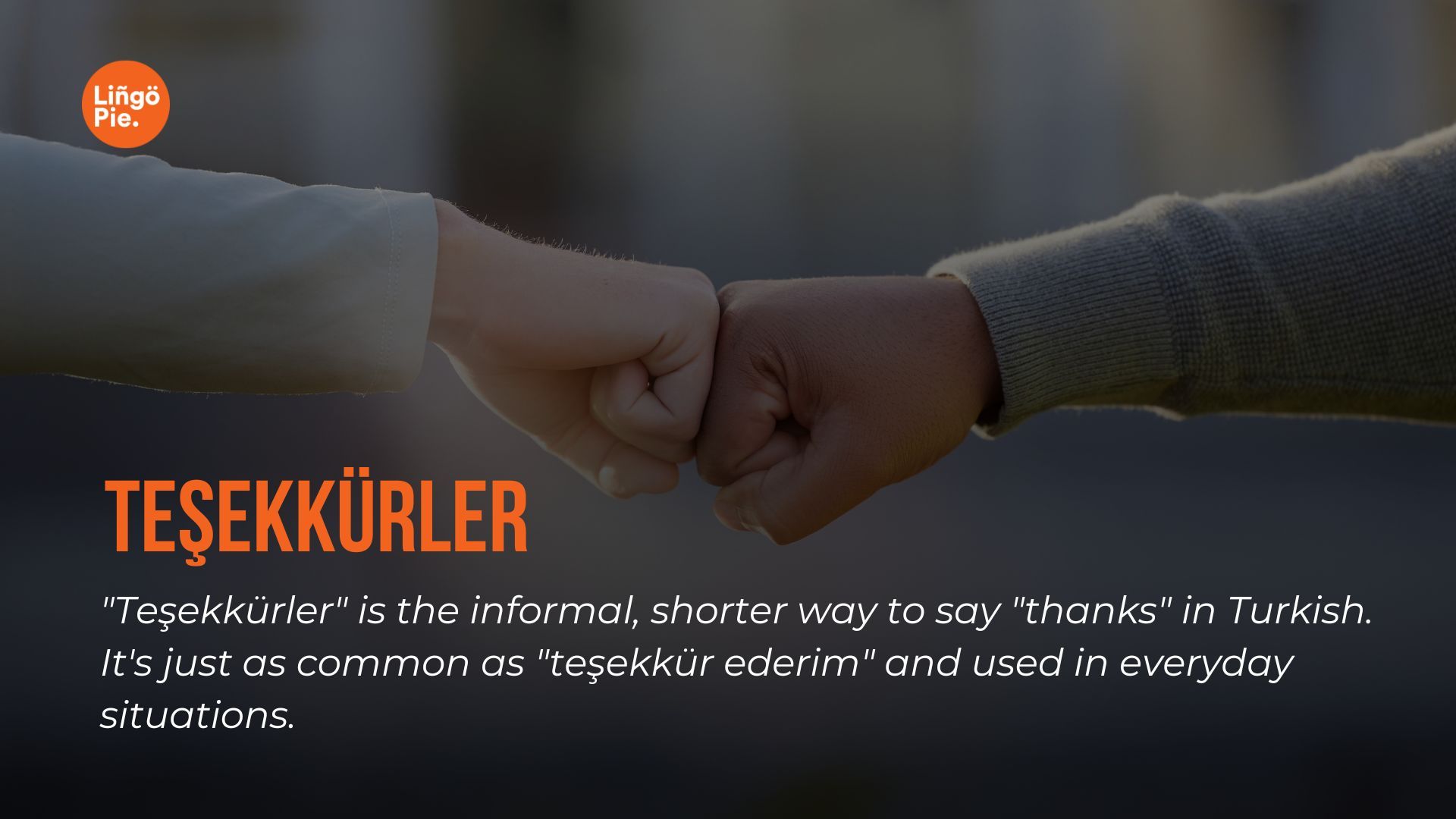
Teşekkürler
Translation: Thanks.
"Teşekkürler" is the informal, shorter way to say "thanks" in Turkish. It's just as common as "teşekkür ederim" and used in everyday situations. To emphasize your gratitude, add "çok" before it: "Çok teşekkürler" means "thanks a lot." This casual phrase is perfect for most daily interactions, from thanking friends to showing appreciation in shops or cafes.
How to respond to Teşekkürler?
or a touch of warmth, try "Sağ olun," which literally means "Be alive" but is used to express gratitude in return. If you want to emphasize that the favor was your pleasure, "Benim için zevkti" (It was my pleasure) works well.
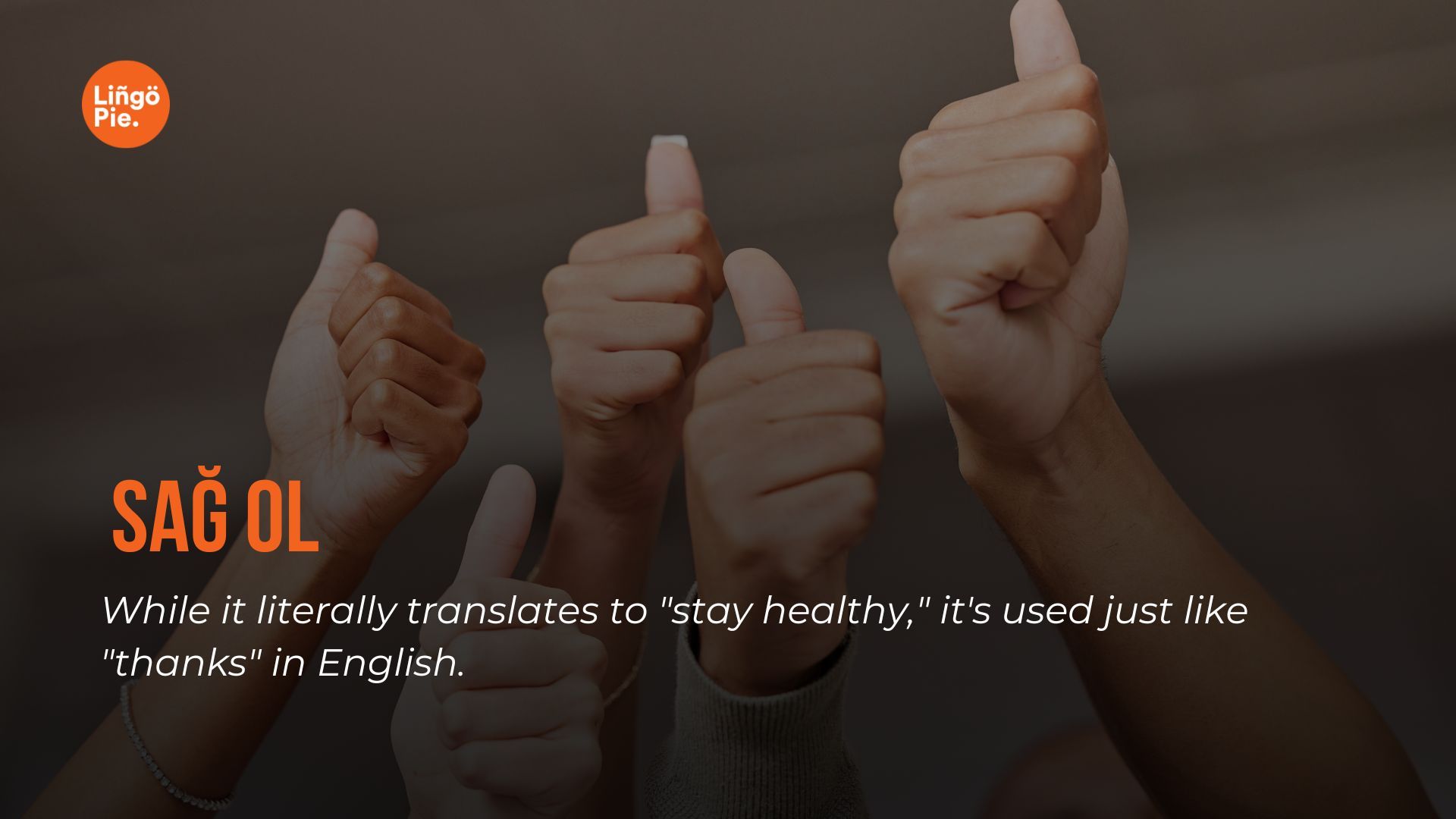
Sağ ol
Translation: Thanks.
"Sağ ol" is your go-to phrase for a casual, friendly way to say thanks in Turkish. It's more laid-back than "teşekkür ederim" or "teşekkürler," perfect for everyday situations with friends or in relaxed settings. While it literally translates to "stay healthy," it's used just like "thanks" in English. This phrase carries a warm sentiment, almost like you're wishing good health to the person as a way of showing gratitude.
How to respond to Sağ ol?
When someone says "Sağ ol" to you, you can respond in a few casual, friendly ways:
- "Sen de sağ ol" - Meaning "You stay healthy too," it's the most common and natural response.
- "Canın sağ olsun" - A warmer response meaning "May your soul be healthy," used among close friends.
These responses match the informal tone of "Sağ ol" and keep the conversation flowing naturally. But as always, please remember to choose based on your relationship with the person and the situation's context.

Çok Naziksiniz
Translation: That’s very kind of you.
"Çok naziksiniz" is a more formal and polite way to express gratitude in Turkish. It literally translates to "You are very kind" but functions as a heartfelt "thank you" in certain situations.
This phrase is perfect for more formal settings or when you want to show extra appreciation for someone's kindness or generosity. You might use it when receiving exceptional service, after someone has gone out of their way to help you, or in professional contexts.
How to respond to Çok Naziksiniz?
When someone says "Çok naziksiniz" to you, you can respond in a few ways that match its polite and formal tone:
- "Estağfurullah" - A traditional, humble response that roughly means "I'm not worthy of such praise."
- "Ben teşekkür ederim" - Meaning "I thank you," this turns the gratitude back to the speaker.
- "Görevimiz" - Translates to "It's our duty," a polite way to downplay your kindness.
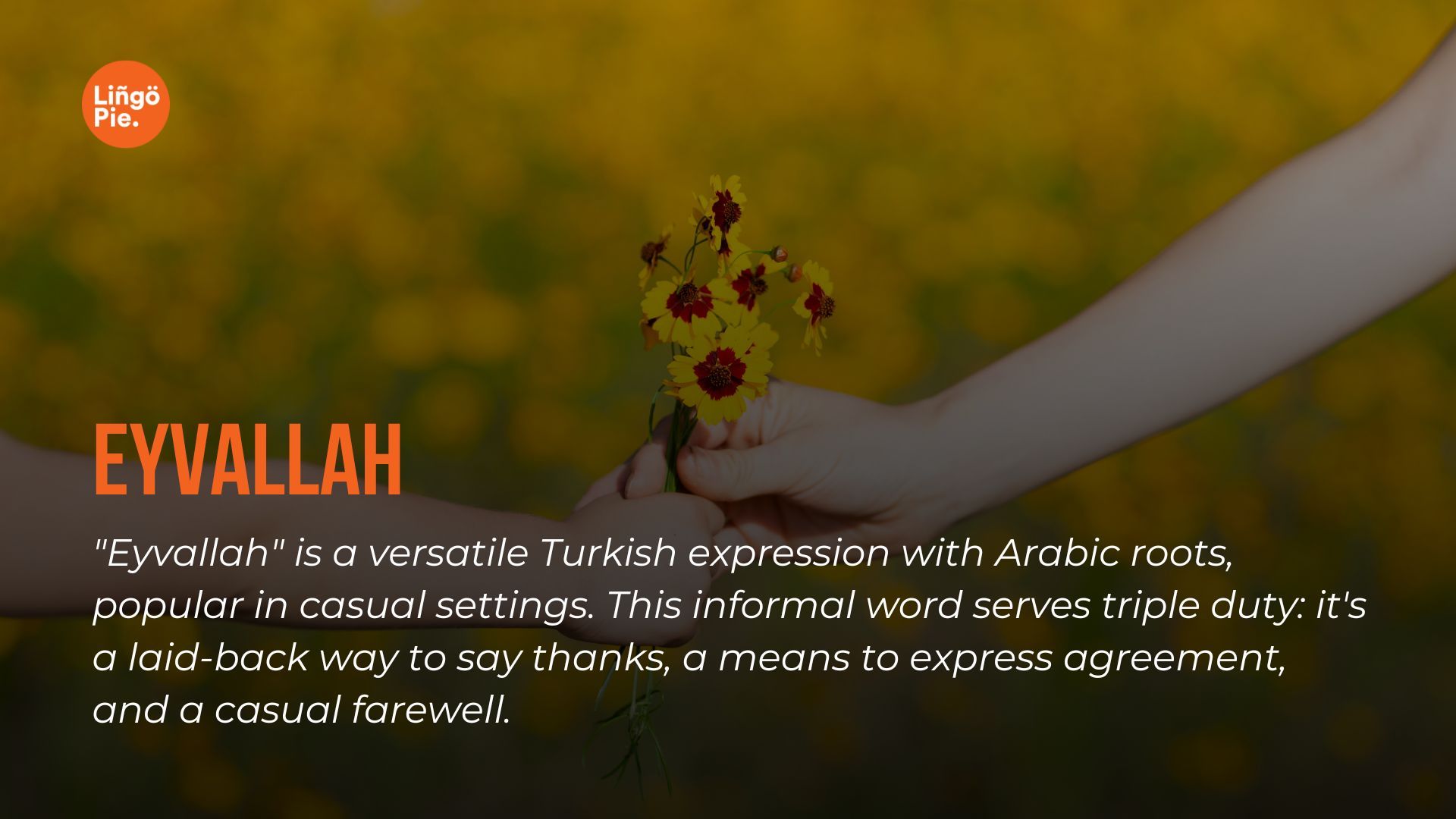
Eyvallah
Translation: Thanks.
You'll hear this a lot among male friends, especially in more relaxed or macho settings. If you've been binge-watching Turkish dramas, you've probably caught the male characters tossing this around instead of the more formal "teşekkür ederim."
Just remember, it's mostly used by and between men, so it might sound a bit off coming from or to women in most contexts.
How to respond to Eyvallah?
Responding to "Eyvallah" is pretty straightforward and keeps the casual, masculine vibe going.
- "Eyvallah" - You can simply say it back, which is common and easy.
- "Hadi eyvallah" - Means "Alright, thanks" and is often used as a casual goodbye.
- "Ne demek" - A friendly "Don't mention it" that fits the informal tone.

Saying Thank You In Turkish In Specific Contexts
While we've covered the basic ways to say thank you in Turkish, the language offers many nuanced expressions for specific situations. Whether you're thanking someone for their kind words, acknowledging their presence, or expressing gratitude for their attention, Turkish has a phrase for it.
| English | Turkish |
|---|---|
| Thank you for your kind words | Nazik sözleriniz için teşekkürler |
| Thank you for coming today | Bugün geldiğiniz için teşekkür ederim |
| Thank you for your interest | İlginiz için teşekkür ederim |
| Thank you for your help | Yardımınız için teşekkür ederim |
| Thank you for your time | Zamanınız için teşekkür ederim |
| Thank you for your hospitality | Misafirperverliğiniz için teşekkürler |
| Thank you for the invitation | Davetiniz için teşekkürler |
| Thank you for your understanding | Anlayışınız için teşekkür ederim |
| Thank you for your patience | Sabrınız için teşekkür ederim |
| Thank you for the gift | Hediye için teşekkür ederim |
These phrases allow you to express gratitude more specifically, showing that you truly appreciate the particular action or quality you're thanking the person for.
Using Thank You In Turkish Conversations
Let's explore a typical scenario where you might use different ways to express gratitude in Turkish. This dialogue takes place between two friends, Ayşe and Mehmet, after Mehmet helps Ayşe move into her new apartment.
| English | Turkish |
|---|---|
| Ayşe: Thank you so much for helping me move today, Mehmet. | Ayşe: Bugün taşınmama yardım ettiğin için çok teşekkür ederim, Mehmet. |
| Mehmet: Don't mention it. That's what friends are for. | Mehmet: Rica ederim. Arkadaşlar bunun için vardır. |
| Ayşe: No, really. I appreciate your time and effort. | Ayşe: Yok, gerçekten. Zamanın ve emeğin için teşekkür ederim. |
| Mehmet: It's nothing. I'm glad I could help. | Mehmet: Önemli değil. Yardım edebildiğime sevindim. |
| Ayşe: You're too kind. Thanks for being such a good friend. | Ayşe: Çok naziksin. Böyle iyi bir arkadaş olduğun için sağ ol. |
| Mehmet: You're welcome. Let me know if you need anything else. | Mehmet: Ne demek. Başka bir şeye ihtiyacın olursa haber ver. |
| Ayşe: Will do. Thanks again! | Ayşe: Tamamdır. Tekrar teşekkürler! |
| Mehmet: Anytime. See you later! | Mehmet: Her zaman. Görüşürüz! |
| Ayşe: See you. You're the best! | Ayşe: Görüşürüz. Adamsın! |
This dialogue showcases various ways to express gratitude, from formal phrases like "çok teşekkür ederim" to more casual expressions like "sağ ol" and the slang term "adamsın." It also demonstrates how to respond to thanks in different ways, helping you navigate a full conversation centered around expressing and acknowledging gratitude in Turkish.
Say Thank You In A New Language With Lingopie!
Now that you've mastered Turkish "thank yous," why not expand your knowledge on other foreign languages? If you're serious about connecting with people across the globe, then you have to give Lingopie a try!
Lingopie is a language learning tool that helps you learn a new language through binge-worthy TV shows and movies. With Lingopie, you can:
- Dive into Spanish telenovelas
- Laugh with hit Japanese animes
- Unravel mysteries in Korean dramas
- Explore German culture through Netflix movies in German
Lingopie simply offers a fun, immersive way to learn languages and naturally pick up real-life phrases, slang, and cultural insights. So what are you waiting for? Ready to turn your screen time into Turkish, French, or even German language sessions?
Give Lingopie a try and see which new language captures your imagination. Your next "thank you" might just be a "gracias," "merci," or "danke schön"!
FAQ
How Do You Say Thank You In Turkish Slang?
While "Teşekkür ederim" and "Teşekkürler" are standard ways to say thank you, Turkish slang offers more casual options:
- Eyvallah - Very informal, typically used between men
- Sağolasın - Casual, friendly way to say thanks
How To Say No Thank You In Turkish?
To say "no thank you" in Turkish, the most common phrase is "Hayır, teşekkürler," which directly translates to "No, thank you." For a more polite refusal, you can say "Teşekkür ederim, istemiyorum," meaning "Thank you, I don't want it." In casual situations, "Sağ olun, gerek yok" (Thanks, it's not necessary) works well.
If you want to be extra polite, especially when refusing an offer of help, use "Zahmet etmeyin" (Don't trouble yourself). These phrases allow you to decline offers or invitations gracefully while still showing appreciation for the gesture.
What Is Shukria In Turkish?
"Shukria" is not a Turkish word, but it has a Turkish counterpart. It comes from Arabic, meaning "to be thankful." The Turkish equivalent is "Şükriye," which is used as a female name. In Turkish, the concept of thankfulness is typically expressed using words like "teşekkür" or "şükür," which are derived from the same Arabic root.


